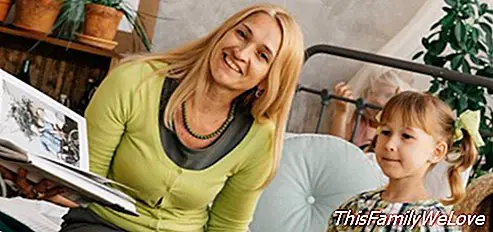Books that help explain Down syndrome to children
Explaining Down syndrome to children is not easy for parents. It is normal that many doubts arise, if what we want is to do it correctly. In this case, books can be very helpful: parents help us to explain ourselves and children to understand it better. Here you have 8 books to talk with your children of Down syndrome.
Children under 3 years old are not usually surprised by the differences, therefore, if they live at home or at school with a child with Down syndrome, it is not usual for them to ask, just to observe. For them it is not a difference, but something new to know. It is from about 4 years, when children begin to socialize, to share with their friends through the collective game ... and to change externalize their universe. It will be then when the questions arise.
How to explain to children what Down syndrome is
Always keep in mind at what stage of development is the child to find the arguments and words to explain what you want. Just as we should not give a scientific argument, we can not tell an unreal version on the subject.
To explain to children what Down syndrome is, it is useful to focus on the characteristics of these children that we see differently, on the difficulties they present and on the unique abilities they have. At a social level, their acceptance or rejection by other children will depend on how they make us feel, so it should be noted that they always want to laugh and share affection and affection.
8 books to talk with children of Down syndrome

Ángels Ponce has compiled a list of books to talk with your children about Down syndrome and other disabilities:
What's wrong with your brother?It is a manual for brothers and sisters of children with disabilities prepared by the MRW Foundation and written by Àngels Ponce in order to promote the well-being of families with children with disabilities and, specifically, to help siblings to understand and share the emotions they experience when they have a brother or sister with a disability. It is a book with activities for parents and children to talk about it. It is recommended from 6 years old. Different
This guide explains in a very visual way, through illustrations, games and a simple and enjoyable language, what diversity consists of, what differences there are between people who have a disability and those who do not have it and, above all, the similarities that exist between both. Both the format and the content are adapted for the youngest ones, becoming a useful document for their formation within the school and family environment. Its author is Ángels Ponce.
My brother chases dinosaurs
The story of Gio, a child with an extra chromosome. An intimate story, tender and moving, that underscores the wonderfulness of diversity. With a deep but comical, affectionate and personal treatment of a topic of social interest such as Down syndrome. To write it, its author Giacomo Mazzariol has not needed to invent anything. Ed. Ink Cloud.
Malko and dad
Gusti invites us to enter the intimacy of their family environment to tell us what it means to live with such a special child. A touching work that portrays the lights and shadows of a father who goes from perplexity and bewilderment, to unconditional love. A love that goes to their loved ones and, especially, to their little one with Down syndrome. Ed. Ocean Crossing.
I have Down syndrome
This book aims, in a sincere way, to bring children and adults to David, a child with Down syndrome. Although at first glance it may seem different, she loves the same things as the rest of the children: she likes to doodle, draw, create * And most importantly: she loves life. The desire of this book is to put an end to the mistaken beliefs about children with Down syndrome, to get a wider readership to better understand what is going on and to normalize the deal with all these children. Ed. Jaguar.
Willy Planet
In this autobiographical album, Birte Müller, the author and illustrator, introduces us to Willy's life and what it means to live with him. Willy, his son, was born with Down syndrome. And while life with Willy can sometimes go through difficult times, Willy is a happy person who makes many other people happy. Willy teaches us the important things for him, what he likes and what he does not. Willy teaches us to see our apparently "normal" world with his eyes and to feel it as he feels it, with all the intensity and spontaneity that life holds for us every day. The metaphor of Willy as an inhabitant of another planet brings us closer to many people from whom ignorance often separates us. Ed. Takatuka.
Who is Nuria?
Nuria has a moon face and people, sometimes, stop to look at her on the street.At her school she does a lot of fun things: painting, singing and riding a pony, which is what she likes the most. Sometimes, however, not everyone understands it and then feels different from others. Ed. Edelvives.
Downtown
"My name is Blo, I have Down Syndrome, a girlfriend, lots of friends and a favorite album." Normality and integration are the hallmarks of the comic and carefree strips in this book. In the words of its authors: "Whoever has a family member with Down syndrome has super fun anecdotes, our intention is to tell them from their point of view, with a very simple way of seeing things". Ed. Emocionate - Dibbuks.
Àngels Ponce. Mindfulness instructor for families and family therapist within the disability environment.




